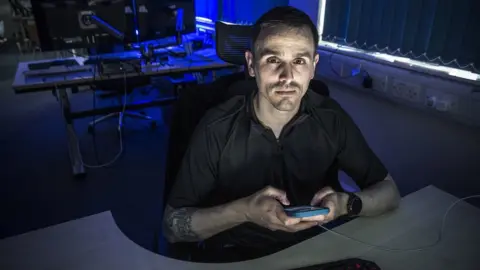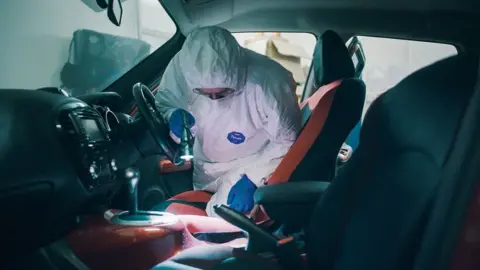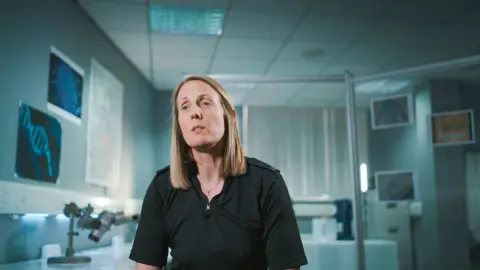AI software helped convict Coventry paedophile, police say
 BBC/Blast Films
BBC/Blast FilmsAdvanced AI software was crucial in proving a paedophile groomed and sexually abused young girls, police reveal in a new TV programme.
The conviction of Luke Cassidy, 29, from Coventry, has been documented by BBC Two's Forensics: The Real CSI.
Investigators said they struggled at first to find enough evidence to prove Cassidy controlled and groomed girls.
But via his phone they went on to find deleted messages and photos which led to his conviction in January.
Warning: this article contains information some people may find distressing.
 BBC/Blast Films
BBC/Blast FilmsCassidy was arrested when a 12-year-old girl reported he groomed her on the social media platform Snapchat and then raped her.
But while he admitted to detectives he had sex with her, he claimed she told him she was 16. Additionally, his victim's account of grooming was in need of corroboration for prosecution.
First, Cassidy's Nissan Juke was seized by police as forensic coordinator Jo Ward said the victim told them she had been inside the vehicle.
But evidence only proved Cassidy had sex in it - there was no DNA linking his victim to the car.
Digital forensics officer Dan Coley then examined the phones of defendant and victim but could only prove they knew each other and had spoken.
"There is nothing potentially there to support the victim's account of what's happened," he said of an initial stage of the inquiry that ran, he added, the risk of being "the end of that investigation".
But then came a breakthrough, along with the means to unpick Cassidy's account.
 BBC/Blast Films
BBC/Blast FilmsDetectives explained that a 13-year-old girl had come forward to inform them she was sexually propositioned by a man online.
When it became clear Cassidy was behind that content, investigators were finally able to build a case against him that could bring the first victim into their scope.
ArtificialI Intelligence (AI) enables computers to perform complex tasks. In this case, specialist software was trained on the words used in Cassidy's messages to the second victim and then applied to a search for similar language anywhere on Cassidy's phone.
Indecent images of children were uncovered plus messages that showed he was grooming children and was indeed a predator, Mr Coley said.
Cassidy was then charged. In court he pleaded guilty to one charge of rape and one of possession with intent to supply Class B drugs, but he denied a charge of online grooming and five more counts of rape.
However, he was convicted of all charges at Warwick Crown Court in December and jailed for 19 years, with five more on licence. He was also placed on the sex offenders register for an indefinite period.
 West Midlands Police
West Midlands Police"This result matters to me," Mr Coley said. "Not just as a parent but also in the hope that ultimately, we are here to try and help safeguard children."
Det Con Corinne Hatton, from West Midlands Police, said Cassidy targeted the most vulnerable in society and had "taken innocence".
Police said 14 further victims had been uncovered by June and officers were working to identify and support them.
Watch "Forensics: The Real CSI - Tracking a Paedophile" on BBC Two at 21:00 BST on Tuesday 6 June or via BBC iPlayer after broadcast.

Help and support
If you're affected by any of the issues in this article you can find details of organisations who can help via the BBC Action Line.

Follow BBC West Midlands on Facebook, Twitter and Instagram. Send your story ideas to: [email protected]
